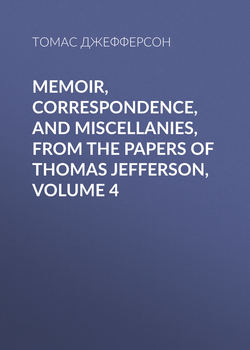Читать книгу Memoir, Correspondence, And Miscellanies, From The Papers Of Thomas Jefferson, Volume 4 - Томас Джефферсон, Thomas Jefferson - Страница 8
LETTER VIII.—TO MR. GALLATIN, December 13, 1803
ОглавлениеTHOMAS JEFFERSON TO MR. GALLATIN.
The Attorney General having considered and decided, that the prescription in the law for establishing a bank, that the officers in the subordinate offices of discount and deposit, shall be appointed ‘on the same terms and in the same manner practised in the principal bank,’ does not extend to them the principle of rotation, established by the legislature in the body of directors in the principal bank, it follows that the extension of that principle has been merely a voluntary and prudential act of the principal bank, from which they are free to depart. I think the extension was wise and proper on their part, because the legislature having deemed rotation useful in the principal bank constituted by them, there would be the same reason for it in the subordinate banks to be established by the principal. It breaks in upon the esprit de corps, so apt to prevail in permanent bodies; it gives a chance for the public eye penetrating into the sanctuary of those proceedings and practices, which the avarice of the directors may introduce for their personal emolument, and which the resentments of excluded directors, or the honesty of those duly admitted, might betray to the public; and it gives an opportunity at the end of the year, or at other periods, of correcting a choice, which, on trial, proves to have been unfortunate; an evil of which themselves complain in their distant institutions. Whether, however, they have a power to alter this or not, the executive has no right to decide; and their consultation with you has been merely an act of complaisance, or from a desire to shield so important an innovation under the cover of executive sanction. But ought we to volunteer our sanction in such a case? Ought we to disarm ourselves of any fair right of animadversion, whenever that institution shall be a legitimate subject of consideration? I own I think the most proper answer would be, that we do not think ourselves authorized to give an opinion on the question.
From a passage in the letter of the President, I observe an idea of establishing a branch bank of the United States in New Orleans. This institution is one of the most deadly hostility existing, against the principles and form of our constitution. The nation is, at this time, so strong and united in its sentiments, that it cannot be shaken at this moment. But suppose a series of untoward events should occur, sufficient to bring into doubt the competency of a republican government to meet a crisis of great danger, or to unhinge the confidence of the people in the public functionaries; an institution like this, penetrating by its branches every part of the Union, acting by command and in phalanx, may, in a critical moment, upset the government. I deem no government safe which is under the vassalage of any self-constituted authorities, or any other authority than that of the nation, or its regular functionaries. What an obstruction could not this bank of the United States, with all its branch banks, be in time of war? It might dictate to us the peace we should accept, or withdraw its aids. Ought we then to give further growth to an institution so powerful, so hostile? That it is so hostile we know, 1. from a knowledge of the principles of the persons composing the body of directors in every bank, principal or branch; and those of most of the stock-holders: 2. from their opposition to the measures and principles of the government, and to the election of those friendly to them: and, 3. from the sentiments of the newspapers they support. Now, while we are strong, it is the greatest duty we owe to the safety of our constitution, to bring this powerful enemy to a perfect subordination under its authorities. The first measure would be to reduce them to an equal footing only with other banks, as to the favors of the government. But, in order to be able to meet a general combination of the banks against us, in a critical emergency, could we not make a beginning towards an independent use of our own money, towards holding our own bank in all the deposits where it is received, and letting the Treasurer give his draft or note for payment at any particular place, which, in a well conducted government, ought to have as much credit as any private draft, or bank note, or bill, and would give us the same facilities which we derive from the banks? I pray you to turn this subject in your mind, and to give it the benefit of your knowledge of details; whereas, I have only very general views of the subject. Affectionate salutations.
Washington, December 13, 1803.
